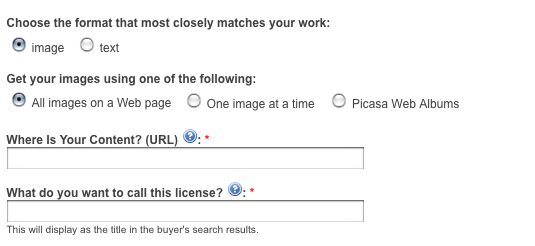Ozmo Offers Simple Licensing
 The Copyright Clearance Center is best known for its work with large publishers, corporations and academic institutions in helping them both obtain rights to works and to license existing ones.
The Copyright Clearance Center is best known for its work with large publishers, corporations and academic institutions in helping them both obtain rights to works and to license existing ones.
But while they’ve always offered services for individual authors, their services were never very well targeted for bloggers, freelance journalists and amateur photographers. The process of registering is far too complicated and the effort has, traditionally, been unlikely to be justified by the reward.
However, last week they announced the opening of their newest service, Ozmo. Ozmo is a very different beast from the main copyright.com offering. Though it serves the same function as the main site, to help copyright holders license their content, it is targeted at your average Web publisher, including current Creative Commons users.
But while the combination of major licensing name and simple licensing tool might seem to be a win/win for content creators, there are several flaws with Ozmo that need to be addressed before most photographers or bloggers seriously consider using the service.
How it Works
The idea behind Ozmo is very simple. If you are a content creator, you register for an account on the service and then create a license for your work. You can choose, at this time, to license either text or images.

Once you determine the what content you want to license, you then provide a name for the license itself to be called, a description of it and select the files to include, if necessary.
After that, you determine the price of the license itself, which includes a difference for high- and low-resolution works when dealing with images, and a slew of other liensing options including the right to use the work in a live performance, in broadcast media, as part of a logo, etc.

You then get to add any special terms and conditions that you might want to add (such as limiting the use in adult content, etc.) and then add a Creative Commons License for non-commercial use if desired. To aid in CC integration, Ozmo uses the CC+ framework to fill the gap between non-commercial CC-licensed use and commercial, paid-for licensing.
Once you’ve done all this, as well as set up your profile (you can view the temporary one I created here), and link to it publicly.
From there, those interested in licensing your content can either find your work via links on your site (or RSS feed through the use of a FeedBurner Feedflare) or by searching the Ozmo site. Either way, you will be taken to a licensing page similar to this one. Where you can purchase the needed rights.

If this process sounds familiar to you, it is for a very good reason. iCopyright recently released its Creators service, which functions in much the same way, and RightsAgent, which recently closed its doors, also had a similar functionality.
The question then becomes how does Ozmo stack up to its competitors, both past and present. The answer is actually very mixed.
The Good
 Ozmo, to its credit, gets a lot of things right.
Ozmo, to its credit, gets a lot of things right.
First, the interface is very well crafted and easy to use. It is bright, colorful and uses easy-to-understand language for almost everything. Though there are several legalese licenses you have to move past to get to the actual licensing process, the actual content licensing is about on target for laypersons.
Second, the pairing with CC+ is truly magnificent. You can even use the system to create a license that will give away commercial rights, such as the one on this site, but it will warn you beforehand. Though it encourages you to use Ozmo to sell commercial rights, which is really the purpose of the service, it doesn’t force your hand. Furthermore, the CC+ buttons that you embed on your site look nice and work well.
Third, I really like the way that Ozmo breaks down the different potential uses. Separating between low and high resolution images as well as other uses that a copyright holder might wish to charge more for. The options aren’t so overwhelming as to be intimidating, but it does help the creator nail down an effective licensing scheme. This clearly comes from their experience on the commercial side. Still, I do find myself wishing for a way to differentiate based upon circulation as well, something it doesn’t do currently.
Finally, Ozmo does a great job connecting with and integrating with other services. Ozmo can import data from Facebook, use FeedBurner Feedflare, work with Picasa and the list is likely to expand moving forward. Ozmo has shown a great deal of dedication of not being a standalone product, but in working with the tools that bloggers already use every day.
However, as great as the things it gets right are, there are many other things that it falls very flat on.
Issues
Sadly, Ozmo is far from perfect, considering the following issues I noticed as I attempted to use the service:
- Bulk Licensing: If you have a lot of images uploaded to your Flickr or hundreds of entries on your blog, it might take a very long while to license all of them on Ozmo. Though Ozmo offers a feature to license all photos on one page, it is done by URL. There is no means to use an RSS feed, thus ensuring future posts get licensed automatically and, with text works, you need to input the information for each article individually. It can be a very tedious process if you have hundreds of items. Picasa users, however, can do a direct import to their account.
- Price: Ozmo takes a 30% fee on all of the transactions. Though it eats the transaction costs, the 30% is still very high, especially considering that iCopyright, currently, doesn’t take any cut at all and a more typical agent fee is around 10% to 15%. Many will be forced to raise their licensing rates to get the amount they desire.
- Payment: The choice of Amazon as the payment broker seems rather odd to me. Though I have no real issue with Amazon, it doesn’t make much sense to use them exclusively when both PayPal and Google offer competing systems that are more widely used and have equal or better reputations. However, it was the decision to use Amazon that has created perhaps the greatest problem of all.
Through it all, the issue that was most unnerving to me took place when I tried to add my Amazon information so I could both buy a license (to test the full process) and set up to be paid (to see how it worked). I went through a series of lengthy pages on Amazon’s site to set up my account but, when it came time to set up my credit card, I ran into a brick wall. Amazon kept insisting that my credit card had expired, even though the expiration is in 2011.

This issue completely prohibited me from testing the rest of the service out and would have, in theory, both prevented me from being paid by a license purchaser or from paying to license someone else’s work through Ozmo.
In Comparison
Currently, there is no licensing system that I feel is 100% ready to change the game for bloggers and other Web content creators. Though iCopyright has a very strong system in Creators, it too has some flaws and glitches that need to be addressed as well as an expanded need for simplicity.
However, iCopyright’s flaws are not lethal to the system itself. Furthermore, with iCopyright, you do not have to register each individual work nor do you have to worry about the cut that iCopyright is going to take out of the licensing. On the flip side though, iCopyright does not offer a standalone search function that would allow a potential purchaser to discover the work on iCopyright’s site, thus bypassing the creator’s site completely. This could, theoretically, add an element of promotion on Ozmo that isn’t available in iCopyright.
In the end, both services have their good and their bad, but I think that iCopyright will be appropriate for the vast majority of people reading this. The ease of licensing and better price will far outstrip the partnership and promotional advantages of Ozmo. However it is clear that both products are in their early development stages and we will have to see how they evolve over time.
Conclusions
Two years ago, this seemed impossible. Right now we have two major licensing agencies, iCopyright and the CCC, that have both created competing products targeted at helping bloggers, large and small, license their work via the Web.
Though both systems have their flaws, they both show a great deal of dedication to reaching out to this new market and creating systems that could, one day, become commonplace on most sites. However, they will require a great deal of work to come into full fruition.
Still, these are very exciting times to be a blogger and I encourage anyone who is interested to get involved with one or both of the services listed, if for no other reason than to help these companies grow and improve their products.
The companies are making their investment, it is time for the creators to do the same if they want these services to thrive.
Want to Reuse or Republish this Content?
If you want to feature this article in your site, classroom or elsewhere, just let us know! We usually grant permission within 24 hours.
